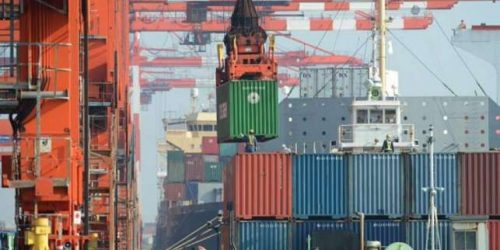KARACHI:
Pakistan’s economy has started showing signs of recovery from the Covid-19 pandemic as Port Muhammad Bin Qasim handled 9% more cargo in July 2020 compared to the corresponding month of previous year.
In a tweet on Thursday, Federal Minister for Maritime Affairs Syed Ali Haider Zaidi underlined that the Port Qasim Authority (PQA) handled 4.8 million tons of cargo in July 2020 against 4.4 million tons in July 2019.
“This is the highest ever cargo tonnage handled in a single month in the PQA’s history,” he said. “The economy is bouncing back and businesses are showing confidence in Prime Minister Imran Khan’s policies and the economic team.”
Institute of Chartered Accountants of Pakistan (ICAP) Economic Advisory and Government Relationship Committee Chairman Ashfaq Tola said had the minister given additional details, one could have gauged the scenario properly.
According to him, the rise in cargo handling at the Port Qasim came apparently on the back of high imports.
“This is a sign of improvement as Pakistan went through tough times just like rest of the world,” he told The Express Tribune. “It is only natural that the economy will recover initially on a small scale, although it is quite early to say anything about complete recovery of the economy.”
According to a report of the Port Qasim Authority, the number of ships at the port rose 3% to 138 in July 2020 as opposed to 134 in July 2019.
To recall, Pakistan’s exports had surged as the economy reopened after lockdown. Textile exports rose 14.4% to $1.27 billion in July 2020 against $1.11 billion in July 2019, according to the Pakistan Bureau of Statistics (PBS).
Similarly, cement exports jumped 35.35% on a monthly basis to $23 million against June 2020.
“Exports have risen primarily due to revival of economic and industrial activities around the world,” stated Shajar Capital in a research report.
On the other hand, a stronger euro and US dollar during July 2020 caused a decline in import of cotton, machinery, motor vehicles and textile items compared to June 2020.
Moving on to petroleum products, crude oil imports surged 50.55% to $203 million in July 2020 on a month-on-month basis.
“The increase was caused by an average hike of 17.19% in international oil prices to $43 per barrel in July,” the report said. It pointed out that crude prices had been at $37 per barrel in June 2020.
The overall scenario has translated into a decline of 19.7% in trade deficit to $1.69 billion in July 2020 on a monthly basis, said the report.
“On a yearly basis, the trade deficit of the country declined 7.66% compared to July 2019 reading of $1.83 billion,” the report added. “Exports grew 25% month-on-month and 6% year-on-year to $2 billion in July 2020.”





